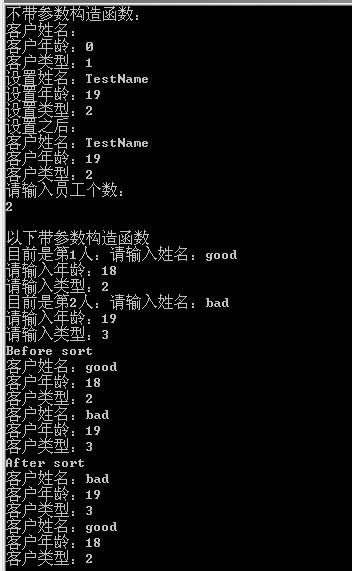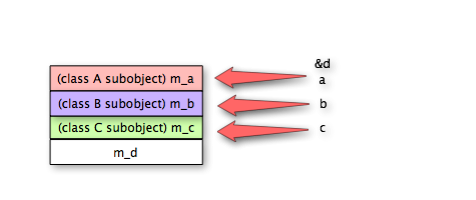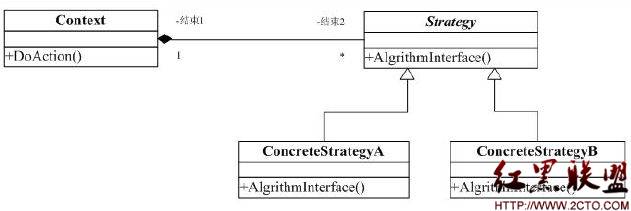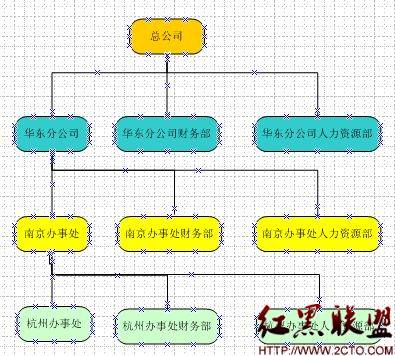boost::bind四种应用场景的例子
[cpp]int f(int a, int b){return a + b;}int g(int a, int b, int c){return a + b + c;}// 函数指针定义typedef int (*f_type) (int, int);typedef int (*g_type) (int, int, int);// 使用struct仅仅是为了方便, 不必写出publicstruct demo{int f(int a, int b){return a + b;}};// 函数对象struct sf{int operator()(int a, int b){return a + b;}};void test_bind_common(){std::cout << boost::bind(f, 1, 2)() << std::endl;std::cout << boost::bind(g, 1, 2, 3)() << std::endl;}// 1. 普通函数应用boost::bindvoid test_bind_fun1(){// bind(f, _1, 9)(x); // f(x, 9), 相当于bind2nd(f, 9)// bind(f, _1, _2)(x, y); // f(x, y)// bind(f, _2, _1)(x, y); // f(y, x)// bind(f, _1, _1)(x, y); // f(x, x), y参数被忽略// bind(g, _1, 8, _2)(x, y); // g(x, 8, y)// bind(g, _3, _2, _2)(x, y, z); // g(z, y, y), x参数被忽略int x = 1, y = 2, z = 3;std::cout << boost::bind(f, _1, 9)(x) << std::endl;std::cout << boost::bind(f, _1, _2)(x, y) << std::endl;std::cout << boost::bind(f, _2, _1)(x, y) << std::endl;std::cout << boost::bind(f, _1, _1)(x, y) << std::endl;std::cout << boost::bind(g, _1, 8, _2)(x, y) << std::endl;std::cout << boost::bind(g, _3, _2, _2)(x, y, z) << std::endl;}// 2. 成员函数应用boost::bindvoid test_bind_fun2(){demo a, &ra = a;demo *p = &a;// 必须在成员函数前加上取地址操作符&, 表明这是一个成员函数指针// 第二个参数用struct demo, struct demo * 两个类型都可以std::cout << boost::bind(&demo::f, a, _1, 20)(10) << std::endl;std::cout << boost::bind(&demo::f, ra, _2, _1)(10, 20) << std::endl;std::cout << boost::bind(&demo::f, p, _1, _2)(10, 20) << std::endl;}// 3. 成员变量void test_bind_val(){typedef std::pair<int, std::string> pair_t;pair_t p(123, "string");std::cout << boost::bind(&pair_t::first, p)() << std::endl;std::cout << boost::bind(&pair_t::second, p)() << std::endl;}// 4. 函数对象void test_bind_functor(){std::cout << boost::bind(std::plus<int>(), _1, _2)(10, 20) << std::endl;std::cout << boost::bind(std::modulus<int>(), _1, 3)(11) << std::endl;std::cout << std::boolalpha << boost::bind(std::greater<int>(), _1, 10)(20) << std::endl;std::cout << boost::bind<int>(sf(), _1, _2)(11, 22) << std::endl;}// 可以使用ref库包装了对象的引用,可以让bind 存储对象引用的拷贝,从而降低了拷贝的代价。void test_bind_ref(){// 变量int x = 10;// 11 + 10 + 10std::cout << boost::bind(g, _1, boost::cref(x), boost::ref(x))(11) << std::endl;// 一个函数对象sf af;std::cout << boost::bind<int>(boost::ref(af), _1, _2)(11, 22) << std::endl;}
补充:软件开发 , C++ ,




